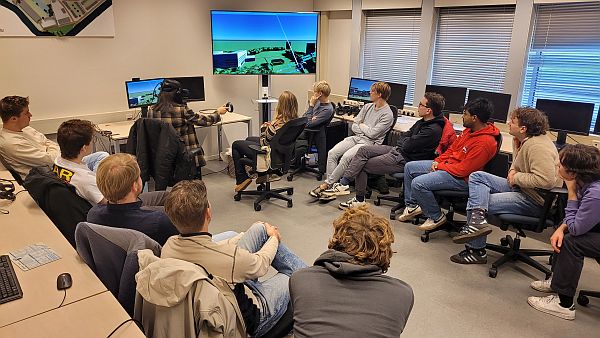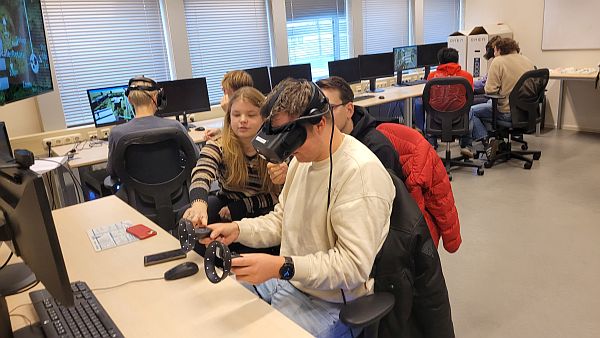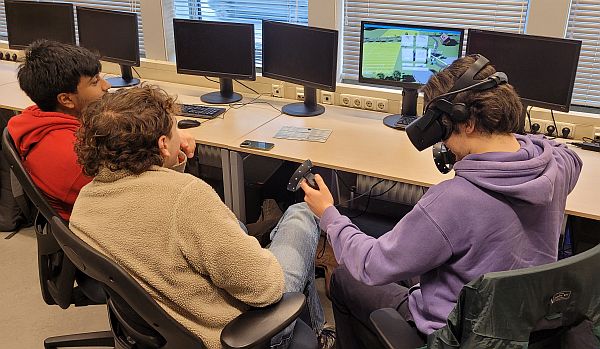Advancing education through innovation: VR Experience Days at the Faculty of Spatial Sciences
How can you use virtual reality to study the effects of building height on the landscape of Lauwersoog, or the accessibility of an urban area when it becomes more densely built? In a notable effort toward integrating technology into education, the Visualization Team at the Faculty of Spatial Sciences hosted Virtual Reality Experience Days on November 15th and 20th.
This initiative, designed for 120 second-year students of the Bachelor’s programme in Spatial Planning and Design, aimed to inspire new approaches to urban design while bridging the gap between technology in practice and innovative educational methods. The event also served as a stepping stone toward fostering research connections for the Faculty's upcoming Master’s programme, Designing Spatial Transformations, emphasizing the integration of technology in future academic and professional explorations.
Harnessing Technology for Future Urban Design and Research
The sessions, held at two state-of-the-art facilities – the Reality Theatre at the CIT building and the Atlas VR Lab at the Faculty of Spatial Sciences – immersed students in a dual experience. At the Atlas VR Lab, participants engaged hands-on with virtual reality tools, learning to navigate the equipment and leverage it for design purposes. The lab is outfitted with high-performance computers capable of running not only VR software but also other demanding applications essential for advanced spatial research and design. These resources make the Atlas Lab a hub for exploring innovative methodologies and technologies that will shape both education and future research within the Faculty.


Meanwhile, the Reality Theatre sessions offered a platform for critical debate, using VR-rendered scenarios to explore themes of urban identity, density, and environmental respect. The Reality Theatre and its capabilities, alongside the expertise of the CIT team, have also gained recognition beyond the academic sphere, with provinces and other entities hiring these resources to present and analyse urban cases. This growing demand highlights the professional value and practical applications of these technologies for engaging diverse stakeholders in meaningful discussions.


The sessions featured two contrasting case studies: the Island of Schiermonnikoog and the Lauwersoog Heritage Center, and the Paddepoel neighborhood near Zernike Campus. Each scenario presented unique design challenges, inviting students to consider the trade-offs between maintaining community identity and pursuing urban development.
For example, in Lauwersoog, reducing the height of a new building preserved the area’s natural landscape and reinforced the principle that development must harmonize with its environment. In contrast, Paddepoel faces decisions about increasing density through vertical growth, posing questions about accessibility, vibrancy, and its future identity within the city fabric, while also addressing the urgent housing crisis. These discussions exemplify how urbanism transcends mere building design, focusing on creating meaningful spaces that resonate with people.
Student Perspectives: The Power of VR
The students who participated in the Experience Days reflected positively on the unique opportunity to engage with VR technology. One student shared: "I can’t wait to have the chance to experience my designs in this way. Being able to immerse myself in the spaces I’m creating will really help me understand how they work and how people might feel in them. It’s a game-changer." Another commented on how the hands-on aspect of the Atlas VR Lab brought their studies to life: "The VR session wasn’t just about using cool technology – it was about seeing how my ideas could impact real spaces. It made me think more critically."


Virtual Reality as a Tool for Collaboration, Research, and Community Engagement
One of the most significant achievements of the VR Experience Days was showcasing the transformative potential of virtual reality in fostering collaborative design, research, and debate. By providing participants with shared visual and experiential references, VR facilitated more informed and inclusive discussions among students, educators, and stakeholders.
Reflecting on the event, one of the organizers, Júlia dos Anjos Marques, highlighted the impact of the Reality Theatre sessions: "After the sessions ended, I saw students staying longer, still debating the scenarios we had proposed. They were engaged, critically analysing the possibilities and implications of each design. This was the best possible outcome – exactly what we had hoped and worked for."
Shaping the Future Through Education and Research
As urbanism and urban planning increasingly intersect with technology and community values, initiatives like these highlight the importance of equipping future spatial planners with tools that inspire creativity, critical thinking, and collaboration. The integration of VR technology offers not just immediate educational benefits but also a platform for ground-breaking research, ensuring that students and faculty remain at the forefront of socio-spatial transformation discussions. In doing so, the Faculty of Spatial Sciences continues to lead in fostering an academic environment where innovation, policy, and community engagement converge, paving the way for better-designed spaces and a more thoughtful approach to urban transformation.
The success of the VR Experience Days reflects the Faculty’s broader vision of leveraging technology to enrich education and societal debate. By linking initiatives like this to proposal such as the new Designing Spatial Transformations Master’s programme, the Faculty demonstrates its commitment to building a research-oriented framework where innovation and critical inquiry intersect.
The event was orchestrated by the Faculty's Visualization Team, led by Coordinator of Design Education and Research Niels Grootjans and lecturing PhD candidates Júlia dos Anjos Marques and Yun Sun, in collaboration with the CIT Visualization Team under the leadership of Dr Gert-Jan Verheij. Their joint efforts not only brought the Experience Days to fruition but also equipped students with access to VR headsets and softwares for use throughout the Urbanism Atelier Course, coordinated by Assistant Professor Dr. Farzaneh Bahrami. This collaboration underscores the Faculty’s dedication to merging education with cutting-edge technology to prepare students for real-world challenges while laying the groundwork for future research initiatives.
| Last modified: | 12 December 2024 12.44 p.m. |
More news
-
11 March 2025
East Groningen: universal basic services must be up to standard
Sjierdan Koster makes the case for long-term thinking and for bringing Groningen’s universal basic services up to standard.
-
05 March 2025
Women in Science
The UG celebrates International Women’s Day with a special photo series: Women in Science.
-
11 February 2025
Verbeelding in Verandering - hoe om te gaan met verandering en te komen tot een inclusiever gesprek over het platteland van morgen
Het Nederlands landelijk gebied staat voor een groot aantal ruimtelijke opgaven, bijvoorbeeld op het gebied van klimaat, waterkwaliteit, agrarisch landgebruik en leefbaarheid in dorpen. Hoe de benodigde transities gezamenlijk vorm te geven is een...
